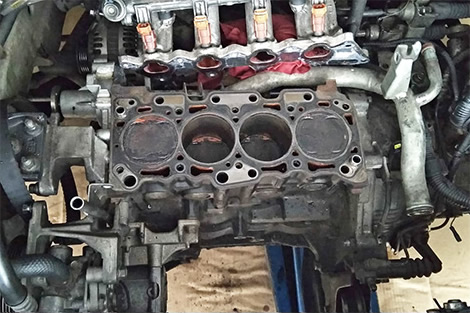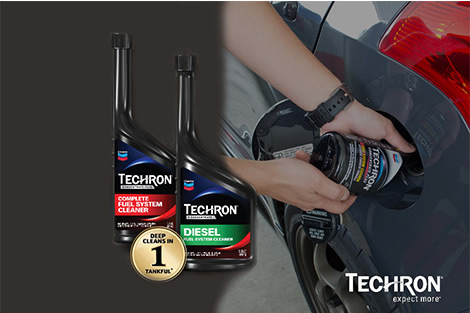Here's how you can improve your engine's fuel consumption and performance
19 Sep 2019|32,953 views


HOW TO GET
BETTER PERFORMANCE AND FUEL ECONOMY
BETTER PERFORMANCE AND FUEL ECONOMY
Text | Goh Zhi Xuan
Photos | Caltex, Editorial Team
Photos | Caltex, Editorial Team
19 September 2019
Deposits build up in an engine and fuel system over time, eventually affecting performance and efficiency. Here's why it happens, and how you can solve it.
Much like how the process of burning wood lines the sides of a fireplace or barbeque pit with soot, carbon is generated as a result of combustion. Carbon and other build up in an engine and fuel system can cause potential issues and detrimental effects on its performance and efficiency. Much like a clogged drainage pipe that impedes water flow, a fuel system that is clogged up with deposits will restrict the flow of fuel, affecting the engine's performance.
Much like how the process of burning wood lines the sides of a fireplace or barbeque pit with soot, carbon is generated as a result of combustion. Carbon and other build up in an engine and fuel system can cause potential issues and detrimental effects on its performance and efficiency. Much like a clogged drainage pipe that impedes water flow, a fuel system that is clogged up with deposits will restrict the flow of fuel, affecting the engine's performance.
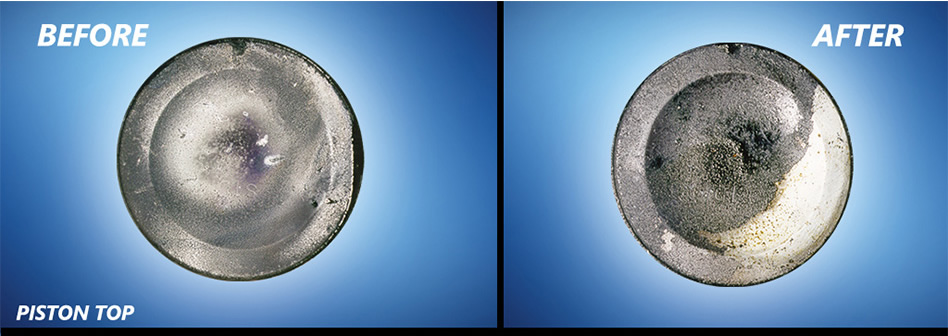

Results after one full tank treatment of Techron® Concentrate Plus. Actual results may vary.
What are the common deposits that affect an engine's performance?
Over time, deposits stick to vital internal parts of the engine, hindering their efficiency. Vehicles that operate primarily in start-stop traffic (such as Singapore) are more susceptible to deposit formation. As deposits build up over time, it is not uncommon for older cars to face serious deposit issues.
So, apart from carbon, what are the usual suspects? Most might not be aware that gasoline, much like food, degrades over time. Unsurprisingly some of the common deposits are the result of degraded gasoline. Additionally, dirt that found its way into the fuel system, rust from metallic components of the car, engine oil and even fuel additives that are of poor quality are also among the common deposits that affects an engine's performance.

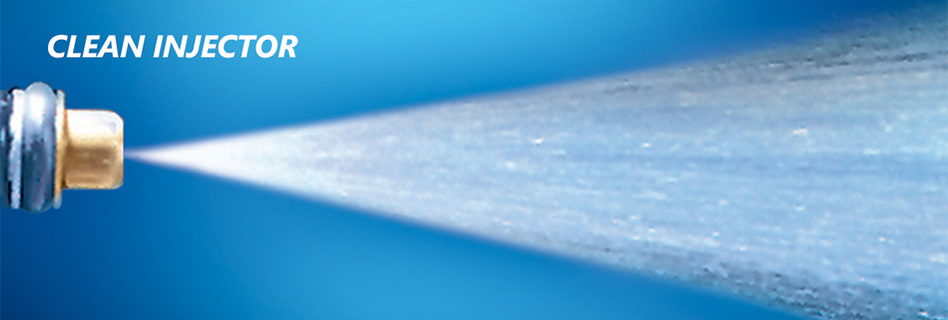
How do deposits cause your engine to lose power and fuel economy?
Engine parts have tight tolerances. They do not work well when foreign particles are lodged between their moving components. That's why engines are designed with multiple filtration systems - the air filter, oil filter as well as fuel filter. However, as explained, carbon and varnish are natural by-products from the combustion and degradation of fuel.
Fuel varnish taints the fuel system, over time it forms deposits inside various components of the fuel system such as the injectors and fuel hoses, restricting fuel delivery. Poor fuel flow can result in a 'lean' condition (too little fuel injected) which can cause misfires, rough idle, hesitation, poor fuel economy and higher emissions.
Meanwhile, deposits and carbon build up on the intake valves and ports will restrict airflow and disrupt the proper mixing of air and fuel, causing hesitation and performance issues. The same deposits can also occur in the combustion chambers, on top of the pistons, causing a slight increase in compression. This can result in engine knock (pre-ignition of fuel, characterised by a knocking or pinging noise) which will not only hinder performance, but also possibly damage the engine.
Getting rid of harmful deposits from your engine
These days, additives (with detergents) are found in the fuels that your car uses. This is an effort to control the amount of deposits within engines. However, the additives found in different grade and brand of fuels varies and some fuels simply do not have an adequate amount of quality additives. Hence deposits can still build up over long periods of usage.
While it is commonly believed that an engine is able to get rid of some carbon build-up on the intake valves and the combustion chamber by itself when operating at high temperature for extended period of time there are no conclusive evidence to prove so.
Hence the most direct way to get rid of deposits would be to take apart the engine and have it thoroughly cleaned. However, this is a time consuming and costly process, which requires a professional mechanic to perform.
The simplest way is to use additives that help to keep your engine clean. Adding quality and proven additives to your tank of fuel is an easy and effective way to dislodge stubborn deposits. You can avoid the complexities of an extensive engine overhaul and yet reap the benefits of a refreshed fuel system and engine by using the right fuel additives.
Caltex Techron® Concentrate Plus and Techron® D Concentrate
Caltex Techron® Concentrate Plus and Techron® D Concentrate are premium fuel additives that deep clean the fuel system in one tank. Techron® Concentrate Plus and Techron® D Concentrate are designed for gasoline vehicles and diesel vehicles respectively. Both additives contain Chevron's Precision Clean™ technology, which works at molecular levels to soften deposits found in critical parts of engine and suspend them in fuel that are then subsequently burnt and ejected through the exhaust.
The range of Techron® technology is the result of more than 30 years of research and development. Techron® Concentrate Plus and Techron® D Concentrate help to clean the fuel system, restore lost power and performance, improve acceleration, reduce engine knock and improve fuel economy. It is easy to use - you simply pour the additive into your near-empty fuel tank before you top up a full tank of fuel and proceed to drive as per usual.
Techron® brand of fuel additives has won the Autoweek's 2019 User's choice 'Best Fuel Additive' award.
Experience the effects of Techron® Concentrate Plus and Techron® D Concentrate and give your engine a new lease on life! Techron® Concentrate Plus and Techron® D Concentrate are available at Caltex stations.
Here are some related articles that might interest you
6 types of car performance modifications to make your car faster on the track
5 things you can do to make your tyres last longer
5 types of car aesthetic modifications you should do
Neglecting these things in your car will cost you a fortune
7 ways to reduce car running costs
Do fuel injector cleaners and octane boosters work?
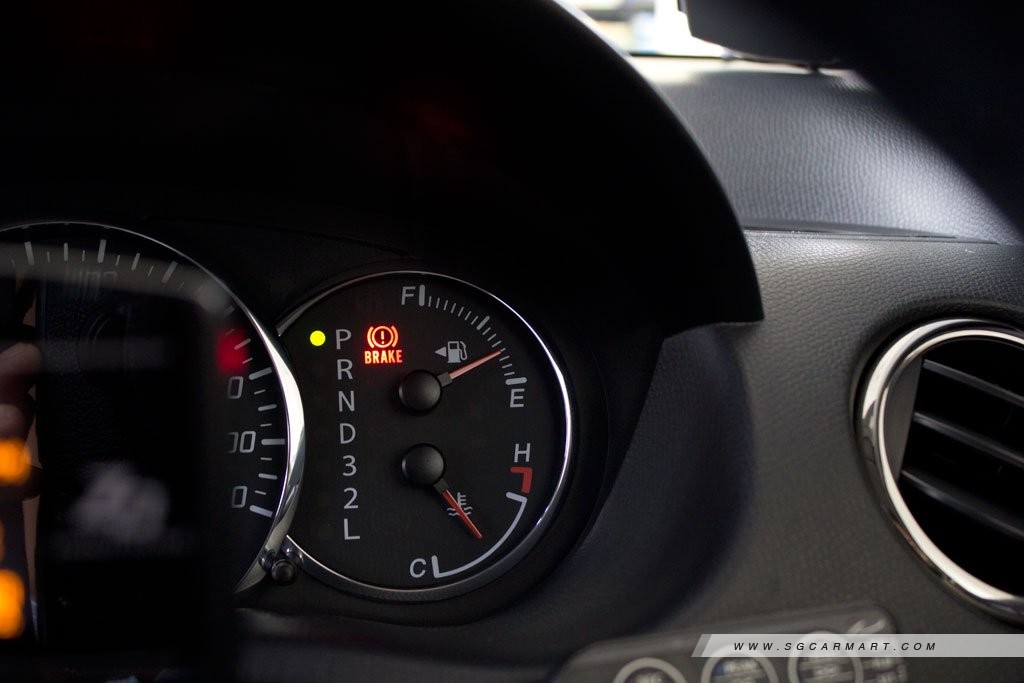
Deposits build up in an engine and fuel system over time, eventually affecting performance and efficiency. Here's why it happens, and how you can solve it.
Much like how the process of burning wood lines the sides of a fireplace or barbeque pit with soot, carbon is generated as a result of combustion. Carbon and other build up in an engine and fuel system can cause potential issues and detrimental effects on its performance and efficiency. Much like a clogged drainage pipe that impedes water flow, a fuel system that is clogged up with deposits will restrict the flow of fuel, affecting the engine's performance.
Much like how the process of burning wood lines the sides of a fireplace or barbeque pit with soot, carbon is generated as a result of combustion. Carbon and other build up in an engine and fuel system can cause potential issues and detrimental effects on its performance and efficiency. Much like a clogged drainage pipe that impedes water flow, a fuel system that is clogged up with deposits will restrict the flow of fuel, affecting the engine's performance.
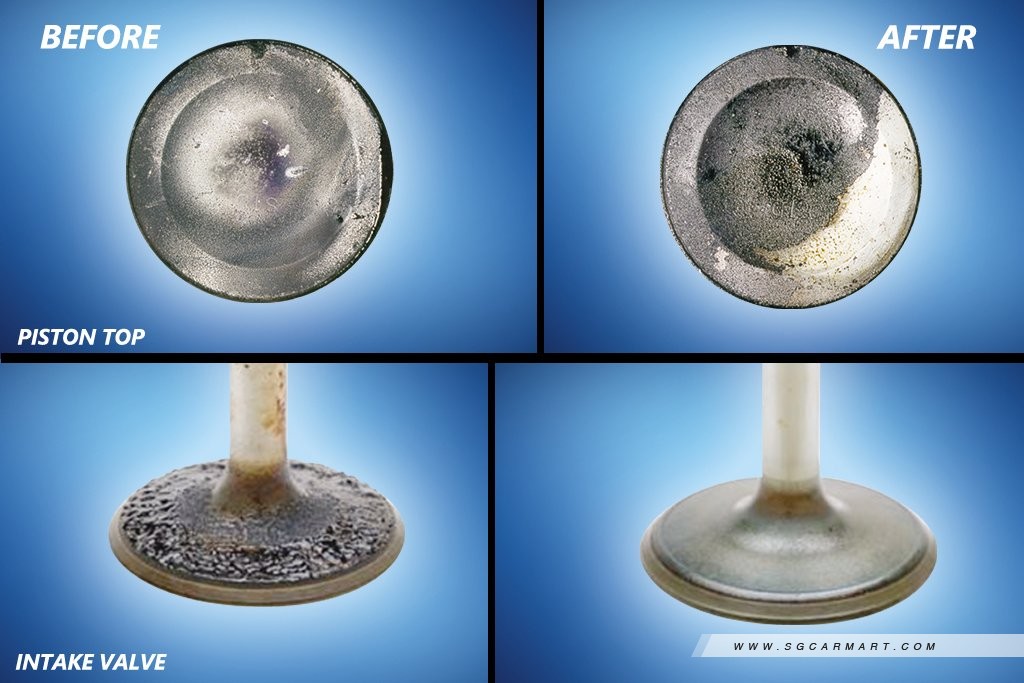
Results after one full tank treatment of Techron® Concentrate Plus. Actual results may vary.
What are the common deposits that affect an engine's performance?
Over time, deposits stick to vital internal parts of the engine, hindering their efficiency. Vehicles that operate primarily in start-stop traffic (such as Singapore) are more susceptible to deposit formation. As deposits build up over time, it is not uncommon for older cars to face serious deposit issues.
So, apart from carbon, what are the usual suspects? Most might not be aware that gasoline, much like food, degrades over time. Unsurprisingly some of the common deposits are the result of degraded gasoline. Additionally, dirt that found its way into the fuel system, rust from metallic components of the car, engine oil and even fuel additives that are of poor quality are also among the common deposits that affects an engine's performance.
Over time, deposits stick to vital internal parts of the engine, hindering their efficiency. Vehicles that operate primarily in start-stop traffic (such as Singapore) are more susceptible to deposit formation. As deposits build up over time, it is not uncommon for older cars to face serious deposit issues.
So, apart from carbon, what are the usual suspects? Most might not be aware that gasoline, much like food, degrades over time. Unsurprisingly some of the common deposits are the result of degraded gasoline. Additionally, dirt that found its way into the fuel system, rust from metallic components of the car, engine oil and even fuel additives that are of poor quality are also among the common deposits that affects an engine's performance.
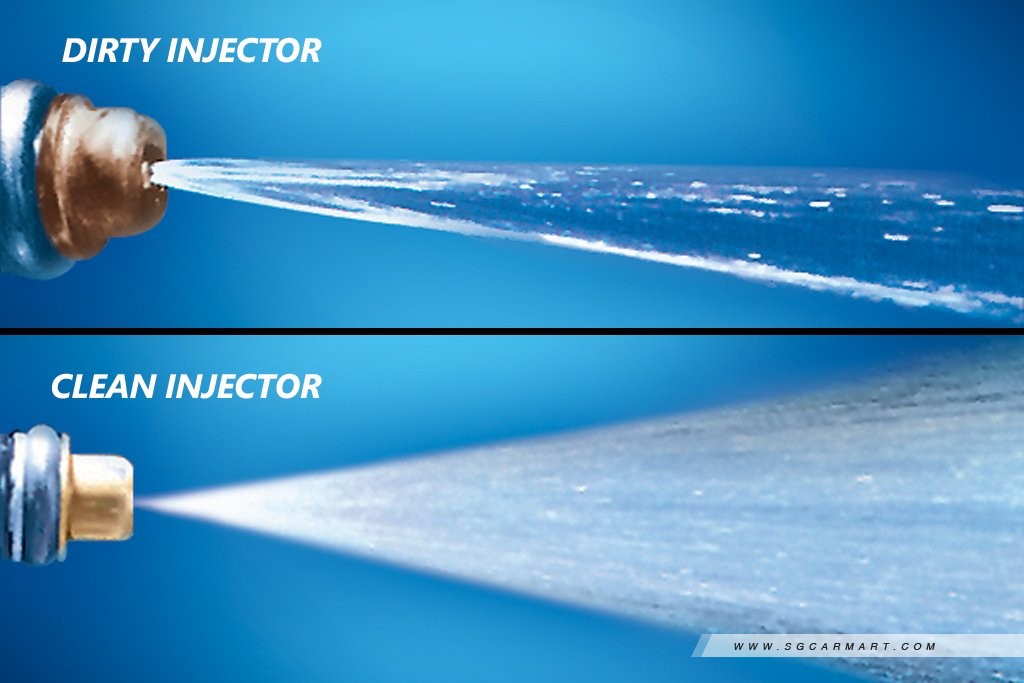
How do deposits cause your engine to lose power and fuel economy?
Engine parts have tight tolerances. They do not work well when foreign particles are lodged between their moving components. That's why engines are designed with multiple filtration systems - the air filter, oil filter as well as fuel filter. However, as explained, carbon and varnish are natural by-products from the combustion and degradation of fuel.
Fuel varnish taints the fuel system, over time it forms deposits inside various components of the fuel system such as the injectors and fuel hoses, restricting fuel delivery. Poor fuel flow can result in a 'lean' condition (too little fuel injected) which can cause misfires, rough idle, hesitation, poor fuel economy and higher emissions.
Meanwhile, deposits and carbon build up on the intake valves and ports will restrict airflow and disrupt the proper mixing of air and fuel, causing hesitation and performance issues. The same deposits can also occur in the combustion chambers, on top of the pistons, causing a slight increase in compression. This can result in engine knock (pre-ignition of fuel, characterised by a knocking or pinging noise) which will not only hinder performance, but also possibly damage the engine.
Engine parts have tight tolerances. They do not work well when foreign particles are lodged between their moving components. That's why engines are designed with multiple filtration systems - the air filter, oil filter as well as fuel filter. However, as explained, carbon and varnish are natural by-products from the combustion and degradation of fuel.
Fuel varnish taints the fuel system, over time it forms deposits inside various components of the fuel system such as the injectors and fuel hoses, restricting fuel delivery. Poor fuel flow can result in a 'lean' condition (too little fuel injected) which can cause misfires, rough idle, hesitation, poor fuel economy and higher emissions.
Meanwhile, deposits and carbon build up on the intake valves and ports will restrict airflow and disrupt the proper mixing of air and fuel, causing hesitation and performance issues. The same deposits can also occur in the combustion chambers, on top of the pistons, causing a slight increase in compression. This can result in engine knock (pre-ignition of fuel, characterised by a knocking or pinging noise) which will not only hinder performance, but also possibly damage the engine.

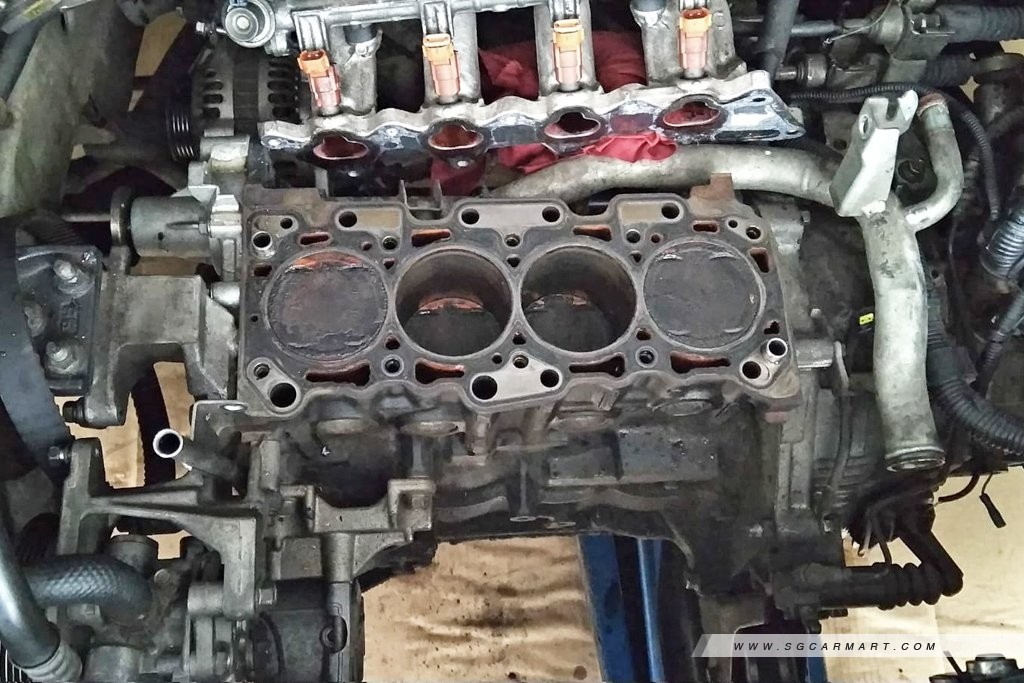
Getting rid of harmful deposits from your engine
These days, additives (with detergents) are found in the fuels that your car uses. This is an effort to control the amount of deposits within engines. However, the additives found in different grade and brand of fuels varies and some fuels simply do not have an adequate amount of quality additives. Hence deposits can still build up over long periods of usage.
While it is commonly believed that an engine is able to get rid of some carbon build-up on the intake valves and the combustion chamber by itself when operating at high temperature for extended period of time there are no conclusive evidence to prove so.
Hence the most direct way to get rid of deposits would be to take apart the engine and have it thoroughly cleaned. However, this is a time consuming and costly process, which requires a professional mechanic to perform.
The simplest way is to use additives that help to keep your engine clean. Adding quality and proven additives to your tank of fuel is an easy and effective way to dislodge stubborn deposits. You can avoid the complexities of an extensive engine overhaul and yet reap the benefits of a refreshed fuel system and engine by using the right fuel additives.
These days, additives (with detergents) are found in the fuels that your car uses. This is an effort to control the amount of deposits within engines. However, the additives found in different grade and brand of fuels varies and some fuels simply do not have an adequate amount of quality additives. Hence deposits can still build up over long periods of usage.
While it is commonly believed that an engine is able to get rid of some carbon build-up on the intake valves and the combustion chamber by itself when operating at high temperature for extended period of time there are no conclusive evidence to prove so.
Hence the most direct way to get rid of deposits would be to take apart the engine and have it thoroughly cleaned. However, this is a time consuming and costly process, which requires a professional mechanic to perform.
The simplest way is to use additives that help to keep your engine clean. Adding quality and proven additives to your tank of fuel is an easy and effective way to dislodge stubborn deposits. You can avoid the complexities of an extensive engine overhaul and yet reap the benefits of a refreshed fuel system and engine by using the right fuel additives.
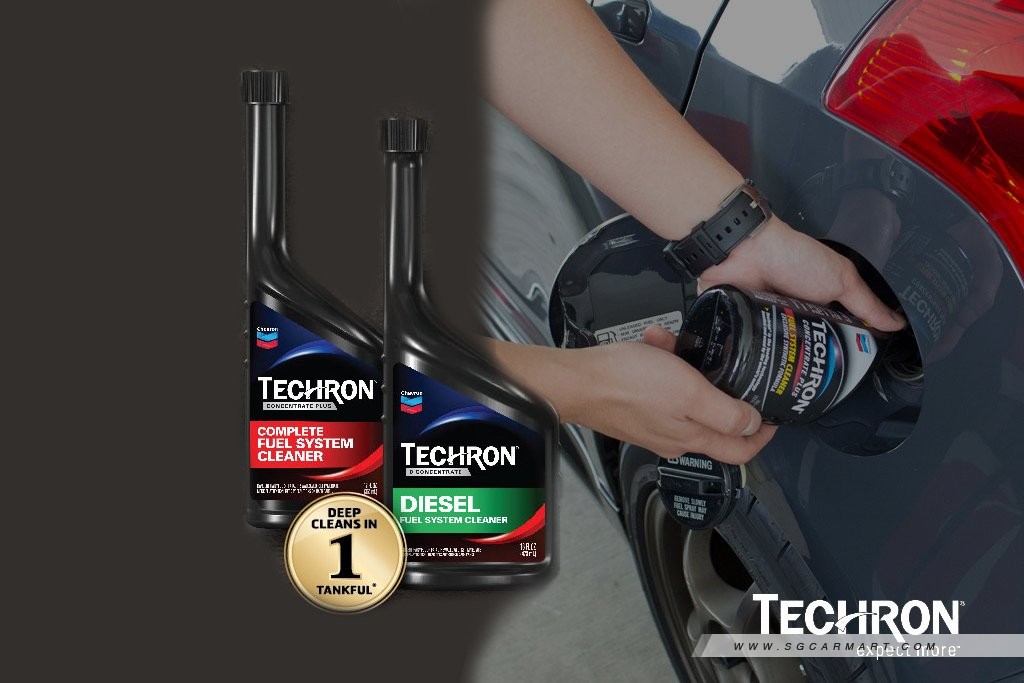

Caltex Techron® Concentrate Plus and Techron® D Concentrate Caltex Techron® Concentrate Plus and Techron® D Concentrate are premium fuel additives that deep clean the fuel system in one tank. Techron® Concentrate Plus and Techron® D Concentrate are designed for gasoline vehicles and diesel vehicles respectively. Both additives contain Chevron's Precision Clean™ technology, which works at molecular levels to soften deposits found in critical parts of engine and suspend them in fuel that are then subsequently burnt and ejected through the exhaust.
The range of Techron® technology is the result of more than 30 years of research and development. Techron® Concentrate Plus and Techron® D Concentrate help to clean the fuel system, restore lost power and performance, improve acceleration, reduce engine knock and improve fuel economy. It is easy to use - you simply pour the additive into your near-empty fuel tank before you top up a full tank of fuel and proceed to drive as per usual.
Techron® brand of fuel additives has won the Autoweek's 2019 User's choice 'Best Fuel Additive' award.
Experience the effects of Techron® Concentrate Plus and Techron® D Concentrate and give your engine a new lease on life! Techron® Concentrate Plus and Techron® D Concentrate are available at Caltex stations.
Here are some related articles that might interest you
6 types of car performance modifications to make your car faster on the track
5 things you can do to make your tyres last longer
5 types of car aesthetic modifications you should do
Neglecting these things in your car will cost you a fortune
7 ways to reduce car running costs
The range of Techron® technology is the result of more than 30 years of research and development. Techron® Concentrate Plus and Techron® D Concentrate help to clean the fuel system, restore lost power and performance, improve acceleration, reduce engine knock and improve fuel economy. It is easy to use - you simply pour the additive into your near-empty fuel tank before you top up a full tank of fuel and proceed to drive as per usual.
Techron® brand of fuel additives has won the Autoweek's 2019 User's choice 'Best Fuel Additive' award.
Experience the effects of Techron® Concentrate Plus and Techron® D Concentrate and give your engine a new lease on life! Techron® Concentrate Plus and Techron® D Concentrate are available at Caltex stations.
Here are some related articles that might interest you
6 types of car performance modifications to make your car faster on the track
5 things you can do to make your tyres last longer
5 types of car aesthetic modifications you should do
Neglecting these things in your car will cost you a fortune
7 ways to reduce car running costs
Do fuel injector cleaners and octane boosters work?
Click here to find out more about Caltex Techron® Concentrate Plus and Techron® D Concentrate








